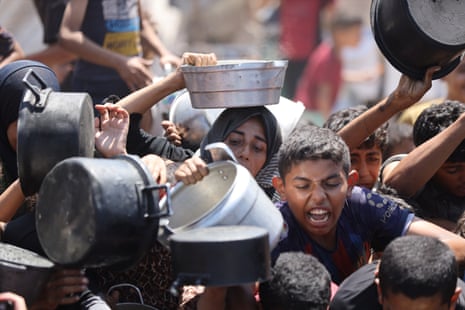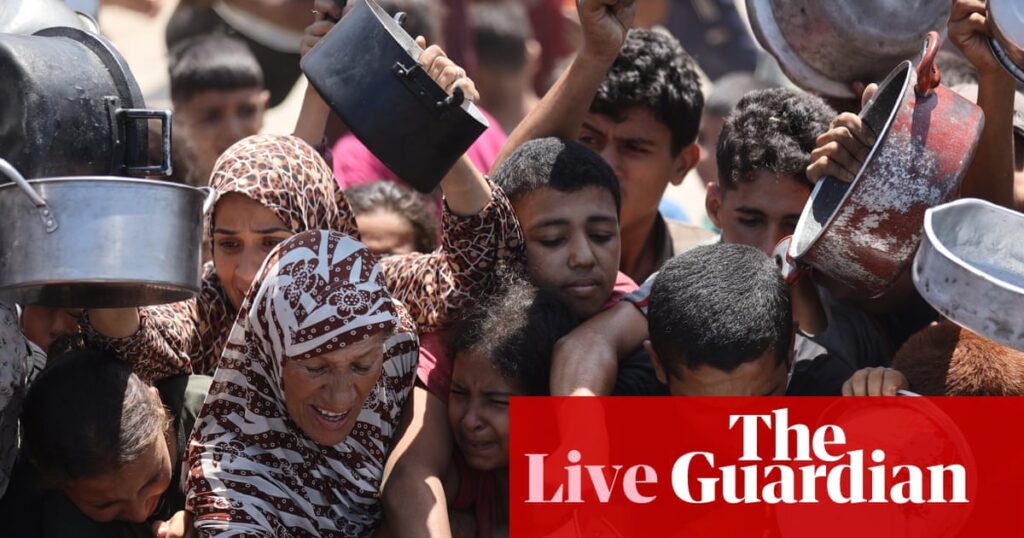It is ‘very evident’ there is not enough food in Gaza, WFP director says
We are restarting our live coverage of Israel’s war on Gaza. The director of the UN World Food Programme, Cindy McCain, said it is “very evident” there isn’t enough food in Gaza, adding that starvation was clearly under way in the territory.
Her comments were made to the Associated Press during a visit to Gaza earlier this week and echo the declaration last Friday of widespread famine in Gaza made by the Integrated Food Security Phase Classification.
“I personally met mothers and children who were starving in Gaza,” McCain said. “It is real and it is happening now.”
McCain said she spoke with Israeli prime minister Benjamin Netanyahu and claimed he is “concerned” about the issue. In the past, Netanyahu has denied the existence of famine in Gaza and said the claims about starvation are a propaganda campaign launched by Hamas and spread by the media.
“We agreed that we must immediately redouble our efforts to get more humanitarian aid in. Access and security for our convoys is critical,” McCain said.

Netanyahu has presided over a government that has been starving Gaza by limiting the amount of aid coming into the territory. Charities say there are ongoing obstructions in being able to collect and distribute aid.
In March and April Gaza was under total siege, with no food entering. Israel justified what was widely seen as the collective punishment of the civilian population as a tactic to pressure Hamas into releasing hostages.
In mid-May Netanyahu said shipments would restart because of international pressure over a “starvation crisis”. But the amount of food and basic essentials let into the territory is still woefully inadequate and many Palestinian people have been killed while trying to collect aid.
Stay with us as we give you the latest updates on Gaza throughout the day.
Key events
UK blocks Israeli officials from its biggest defence show
Israel’s defence ministry has criticised the UK government for excluding its officials from a London arms fair next month, calling it an act of “discrimination”.
A UK government spokesperson said earlier that no Israeli government delegation would be invited to attend the Defence & Security Equipment International (DSEI) event, which will feature national delegations and private companies who showcase military equipment and weapons at London’s Excel centre.
The spokesperson said the Israeli government’s decision to further escalate its assault in Gaza was wrong, in comments seemingly in reference to Israel’s plan to launch a massive new assault on Gaza City within weeks.
“As a result, we can confirm that no Israeli government delegation will be invited to attend DSEI UK 2025,” the spokesperson said.
“There must be a diplomatic solution to end this war now, with an immediate ceasefire, the return of the hostages and a surge in humanitarian aid to the people of Gaza,” the spokesperson added.
Israel’s defence ministry said that as a result of the trade fair ban it would not run its national pavilion at the trade show as it has done previously. Israeli defence companies, such as Elbit Systems, Rafael, IAI and Uvision, will still be able to attend.
“These restrictions amount to a deliberate and regrettable act of discrimination against Israel’s representatives. Accordingly, the Israel Ministry of Defence will withdraw from the exhibition and will not establish a national pavilion,” Israel’s defence ministry said in a statement.
The EU’s foreign policy chief, Kaja Kallas, said this morning that Europe wants to find diplomatic solutions to the Iranian nuclear programme question.
“We are entering a new phase with this 30 days that is now giving us also the opportunity to really find diplomatic ways to find a solution,” Kallas told journalists. “We have this 30 days to sort things out,” she added.
Iran has been enriching uranium to up to 60% fissile purity, a short step from the roughly 90% of bomb-grade, and had enough material enriched to that level, if refined further, for six nuclear weapons, before airstrikes by Israel (and then the US) were launched on Iranian nuclear sites in June, according to the UN nuclear watchdog.
The west says the advancement of Iran’s nuclear programme goes beyond civilian needs, while Tehran says it wants nuclear energy only for peaceful purposes.
UK, Germany and France say they have triggered UN sanctions on Iran

Patrick Wintour
Patrick Wintour is diplomatic editor for the Guardian
The UK, France and Germany have formally notified the UN that they have triggered the restoration of sweeping UN sanctions against Iran, giving Tehran 30 days to make concessions on access to its nuclear sites or face deeper worldwide economic isolation.
UK officials said the decision had not been taken lightly and there had been intensive diplomacy to try to avert this step.
The officials emphasised there was still room for last-ditch diplomacy before the sanctions “snapback” comes into force in 30 days’ time. The annual high-level UN general assembly in September is likely to involve more intensive diplomacy over the situation with Iran.
They added that Iran had been in significant non-compliance with the terms of the 2015 nuclear deal since 2019, saying Tehran had been given ample opportunity to become compliant but had either been unwilling or unable to act.
The International Atomic Energy Agency (IAEA) left Iran after Israel bombed its key nuclear sites, and has been unable to renegotiate a return to assess the state of those sites. Iran has allowed the IAEA inspectors to visit the Bushehr site, where refuelling is due to occur.
David Lammy, the UK foreign secretary, told the Iranian foreign minister, Abbas Araghchi, of the decision by the three European countries in a call on Thursday morning.
You can read the full story here:
Israel rejected the findings of the report, saying they were based on “Hamas lies laundered through organisations with vested interests”, and denied the existence of a famine in Gaza.
We mentioned the findings of the UN-backed Integrated Food Security Phase Classification (IPC) in our opening post.
Here is a bit more detail about the report which said last week that more than half a million people across Gaza are facing “catastrophic” conditions characterised by “starvation, destitution and death”.
The IPC said an “entirely man-made” famine is happening in Gaza City, the territory’s largest, home to hundreds of thousands of Palestinians, and could spread south to Deir al-Balah and Khan Younis by the end of next month.
Only four famines have been declared by the IPC since it was established in 2004, most recently in Sudan last year. The IPC is a globally recognised organisation that classifies the severity of food insecurity and malnutrition.
“This famine is entirely man-made, it can be halted and reversed,” the report says. It continues:
The time for debate and hesitation has passed, starvation is present and is rapidly spreading. There should be no doubt in anyone’s mind that an immediate, at-scale response is needed.
Any further delay – even by days – will result in a totally unacceptable escalation of famine-related mortality.
If a ceasefire is not implemented to allow humanitarian aid to reach everyone in the Gaza Strip, and if essential food supplies and basic health, nutrition and (sanitation and water) services are not restored immediately, avoidable deaths will increase exponentially.
It is ‘very evident’ there is not enough food in Gaza, WFP director says
We are restarting our live coverage of Israel’s war on Gaza. The director of the UN World Food Programme, Cindy McCain, said it is “very evident” there isn’t enough food in Gaza, adding that starvation was clearly under way in the territory.
Her comments were made to the Associated Press during a visit to Gaza earlier this week and echo the declaration last Friday of widespread famine in Gaza made by the Integrated Food Security Phase Classification.
“I personally met mothers and children who were starving in Gaza,” McCain said. “It is real and it is happening now.”
McCain said she spoke with Israeli prime minister Benjamin Netanyahu and claimed he is “concerned” about the issue. In the past, Netanyahu has denied the existence of famine in Gaza and said the claims about starvation are a propaganda campaign launched by Hamas and spread by the media.
“We agreed that we must immediately redouble our efforts to get more humanitarian aid in. Access and security for our convoys is critical,” McCain said.
Netanyahu has presided over a government that has been starving Gaza by limiting the amount of aid coming into the territory. Charities say there are ongoing obstructions in being able to collect and distribute aid.
In March and April Gaza was under total siege, with no food entering. Israel justified what was widely seen as the collective punishment of the civilian population as a tactic to pressure Hamas into releasing hostages.
In mid-May Netanyahu said shipments would restart because of international pressure over a “starvation crisis”. But the amount of food and basic essentials let into the territory is still woefully inadequate and many Palestinian people have been killed while trying to collect aid.
Stay with us as we give you the latest updates on Gaza throughout the day.

